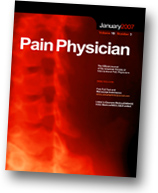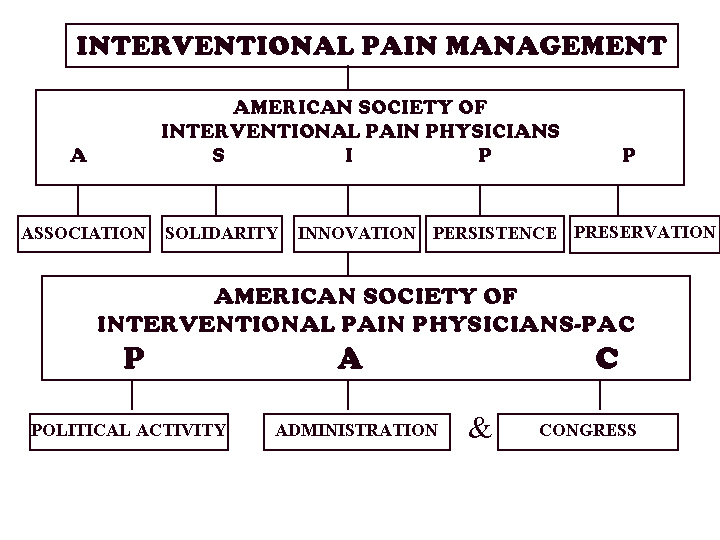
On behalf of the Board of Directors of the American Society of Interventional Pain Physicians, you’re invited to join our rapidly growing society which supports the needs of physicians who practice Interventional Pain Management. ASIPP accomplishes this through our pursuit of excellence in educational programs, publications, certification and political advocacy. ASIPP was formed in 1998 with the goal of promoting the development and practice of safe, high-quality yet cost effective interventional pain management techniques for the diagnosis and treatment of pain and related disorders, and to ensure patient access to these interventions.
Interventional pain management is defined as the discipline of medicine devoted to the diagnosis and treatment of pain related disorders principally with the application of interventional techniques in managing subacute, chronic, persistent, and intractable pain, independently or in conjunction with other modalities of treatment. (The National Uniform Claims Committee. Specialty Designation for Interventional Pain Management- 09, www.cms.hhs.gov/transmittals/Downloads/r1779b3.pdf).
Interventional pain management techniques are minimally invasive procedures including, percutaneous precision needle placement, with placement of drugs in targeted areas or ablation of targeted nerves; and some surgical techniques such as laser or endoscopic diskectomy, intrathecal infusion pumps and spinal cord stimulators, for the diagnosis and management of chronic, persistent, or intractable pain (Medicare Payment Advisory Commission. Report to the Congress: Paying for interventional pain services in ambulatory settings. Washington, DC: MedPAC. December. 2001. http://www.medpac.gov/documents/reports/december-2001-report-to-the-congress-paying-for-interventional-pain-services-in-ambulatory-settings.pdf?sfvrsn=0
Education

ASIPP offers extensive opportunities in advanced training relevant and necessary for the discipline of interventional pain management.
- Interventional Techniques Review Courses
- Comprehensive Cadaver Workshops
- Pain Medicine Board Review
- Comprehensive Course in Controlled Substance
- Management and Coding, Compliance and Practice Management
- Fluoroscopy and Radiation Safety
Publications

Pain Physician Journal – a scholarly body of work specifically geared to interventional pain management. The Pain Physician journal is a quarterly publication that provides a forum for development and dissemination of knowledge through its many original contributions and systematic review. The journal has been indexed and included on Excerpta Medica, EMBASE, Medline, PubMed, and Index

Pain Medicine Case Reports – an open access electronic publication of The American Society of Interventional Pain Physicians and a Clinical Companion Journal to Pain Physician. IPM Reports is a peer-reviewed, multi-disciplinary, open access journal written by and directed to an audience of interventional pain physicians, clinicians and basic scientists with an interest in interventional pain management and pain medicine. IPM Reports presents the latest studies, research, and information vital to those in the emerging specialty of interventional pain management – and critical to the people they serve.
Board Certification
The American Board of Interventional Pain Physicians (ABIPP) is a Specialty Board providing Board Certification.
- Interventional Pain Management
Competency Certifications
- Interventional Pain Management
- Controlled Substance Management
- Coding Compliance and Practice Management
- Regenerative Medicine
- Lumbar Endoscopic Decompression
- Fluoroscopy Interpretation and Radiological Safety
ASIPP was founded in November 1998 as the Association
of Pain Management Anesthesiologists (AOPMA) to represent interventional
pain physicians dedicated to improving the delivery of interventional
pain management services to patients across the country in the various
settings of ambulatory surgical centers, offices, and hospital
outpatient departments. The name seemed to exclude some physicians and
other professionals, so it was changed unanimously to the American
Society of Interventional Pain Physicians. In addition, ASIPP also
started the Interventional Pain Physician-PAC of AOPMA in December 1999
to represent the advocacy interests of interventional pain
physicians. Its name was changed to American Society of Interventional
Pain Physicians-PAC.
Advocacy
ASIPP Goals
- To promote the development and practice of high -quality interventional pain management techniques following SAFE principles: Safety, Appropriateness, Fiscal Neutrality, and Effectiveness for the diagnosis and treatment of pain related disorders, and to ensure patient access to these interventions.
- To advance accountability based on SAFE principles, evidence-based medicine, and compliance in providing the state-of-the-art interventional pain management.
- To communicate with legislators, patients, the public, CMS, and third-party payors about interventional pain management services.
- To pursue excellence in education in interventional pain management.
Mission
